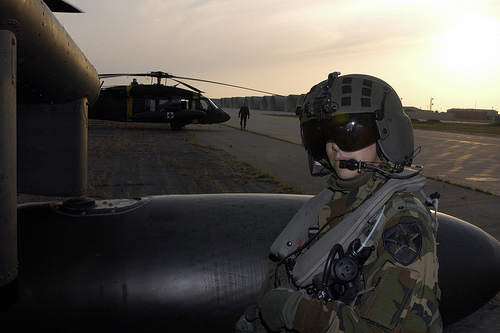US Military Spending: For War or Peace?

Please note that we are not authorised to provide any investment advice. The content on this page is for information purposes only.
The United States has unquestionably been the most formidable military power in recent years. Its spending is the principle determinant of world military spending – a figure that reached $1.6 trillion in 2010.
Generally, US military spending has been on the rise. Recent increases are attributed to the so-called War on Terror and the Afghanistan and Iraq invasions. Today, the US accounts for just under half of world military spending.
The United States has unquestionably been the most formidable military power in recent years. Its spending is the principle determinant of world military spending – a figure that reached $1.6 trillion in 2010.
Generally, US military spending has been on the rise. Recent increases are attributed to the so-called War on Terror and the Afghanistan and Iraq invasions. Today, the US accounts for just under half of world military spending.
The decline seen in recent years is mostly due to Iraq war reduction and redeployment to Afghanistan as well as the attempt to scale that down too. The baseline budget, however, shows a continued increase, albeit at a seemingly lower rate. In addition, the effects of the global financial crisis in 2008 pressured the budget further. Already the rate of increase hints at a slowdown as the department looks to eliminate waste.
But why are the numbers for US spending so much higher than what was announced as the budget for the Department of Defense?
Unfortunately, the budget numbers can be a bit confusing. For example, the Fiscal Year budget requests for US military spending do not include combat figures (which are supplemental requests that Congress approves separately). The budget for nuclear weapons falls under the Department of Energy, and for the 2010 request, was about $25 billion.
The cost of war (Iraq and Afghanistan) has been very significant during George Bush’s presidency. Christopher Hellman and Travis Sharp also discuss the US fiscal year 2009 Pentagon spending request and note that [quote]“Congress has already approved nearly $700 billion in supplemental funding for operations in Iraq and Afghanistan and an additional $126 billion in FY’08 war funding is still pending before the House and Senate.”[/quote]
Some argue that high US military spending allows other nations to spend less. But this view seems to change the order of historical events:
- During the Cold War, high spending was common around the world.
- High spending was reduced by allies such as various European and Asian countries as the Cold War ended (almost 2 decades ago) not because other nations felt they would be protected by the US — a dangerous foreign policy choice by any sovereign nation to rely so much on others in this way — but because they perceived any global threat from the Cold War had diminished and simply didn’t need such high spending any more; globalization of trade was supposed to be ushered in and lead to a new era.
- It was only the US as the remaining global super power that maintained a high budget. Many argue this was to strengthen its position as sole super power and that its “military industrial complex” was able to convince their public to maintain it.
Past empires have throughout history have justified their position as being good for the world. The US is no exception.
However, whether this global hegemony and stability actually means positive stability, peace and prosperity for the entire world (or most of it) is subjective. That is, certainly the hegemony at the time, and its allies would benefit from the stability, relative peace and prosperity for themselves, but often ignored in this is whether the policies pursued for their advantages breeds contempt elsewhere.
[quote]But even for the large US economy, the high military spending may not be sustainable in the long term. Noting trends in military spending, SIPRI added that the massive increase in US military spending has been one of the factors contributing to the deterioration of the US economy since 2001. SIPRI continues that, “In addition to its direct impact of high military expenditure, there are also indirect and more long-term effects. According to one study taking these factors into account, the overall past and future costs until year 2016 to the USA for the war in Iraq have been estimated to $2.267 trillion.”[/quote]In this case, massive military spending in the US has not led to a much global peace.
Story from Global Issues.





